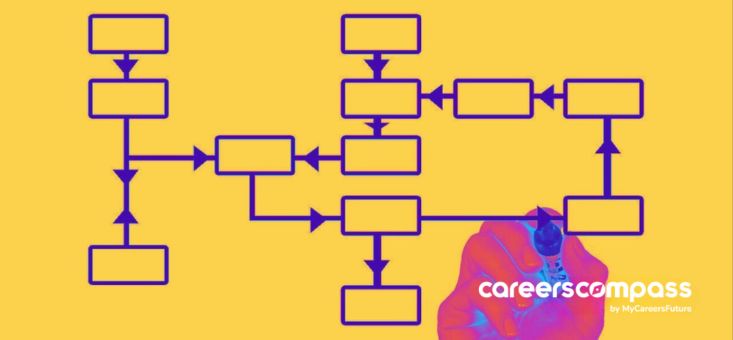In a dynamic and ever-evolving world of work, strategic career planning has become indispensable. Even if you’re in a stable job, charting a career roadmap is essential if you’re seeking progression in your professional journey – and we don’t mean just a bump in your salary, either.
A bigger salary is always welcome, but it’s important to realize that career growth is not merely measured by a fatter paycheque; it’s about holistic growth and a sense of accomplishment that goes beyond numbers.
Ready to take control of your career trajectory? We bring you seven tips for effective career planning.
Seven tips for effective career planning
- Know your strengths and passions
- Set clear and realistic goals
- Research the job market and industry trends
- Invest in continuous learning
- Network and build professional relationships
- Embrace flexibility and adaptability
- Seek feedback and evaluate progress
1. Know your strengths and passions
The first step in any successful career planning process is to take the time to evaluate your strengths, skills, and abilities. Consider the tasks that come naturally to you and the ones you enjoy the most.
Additionally, identify your passions and the areas that ignite a sense of purpose within you. By understanding your core competencies and interests, you can align your career path with your true aspirations.
2. Set clear and realistic goals
Once you have a clear understanding of your strengths and passions, set specific and achievable career goals. These goals should be realistic and time-bound to create a sense of direction and motivation.
Break your long-term objectives into smaller, short-term goals, making them more manageable and attainable. Regularly review and adjust these goals as you progress and evolve in your career.
3. Research the job market and industry trends
Stay informed about the job market and industry trends relevant to your career goals. Identify the skills and qualifications that are in demand and forecasted to be essential in the future.
Tailor your professional development efforts and stay ahead of the curve. Additionally, research potential employers and companies that align with your values and career aspirations.
4. Invest in continuous learning
In today’s rapidly changing job market, continuous learning is key to career advancement. According to experts, a learned skill loses half its value every five years so you should assess your skills every two or three years.
Develop a growth mindset and seek out opportunities to acquire new upskilling skills, either through formal education, online courses, workshops, or certifications. Consider mentorship or coaching programs to gain valuable insights from seasoned professionals.
5. Network and build professional relationships
Networking is a powerful tool in career planning. Attend industry events, conferences, and seminars to connect with like-minded professionals and potential mentors. Learn from experts on the basics of effective networking in the video below:
Utilise social media platforms, such as LinkedIn, to expand your professional network and stay up-to-date with industry developments. Building meaningful relationships can open doors to new opportunities, provide valuable advice, and expose you to different perspectives.
6. Embrace flexibility and adaptability
In today’s fast-paced world, flexibility and adaptability are crucial to career success. Embrace change and be open to exploring new avenues that might arise unexpectedly. The ability to adapt to different situations and environments will enable you to seize opportunities and navigate through uncertain times effectively.
7. Seek feedback and evaluate progress
Regularly seek feedback from supervisors, colleagues, mentors, and even friends and family. Constructive criticism can help you identify areas for improvement and potential blind spots.
Assess your progress towards your career goals periodically. Review your accomplishments, setbacks, and learning experiences. This self-evaluation will help you stay on track and make informed decisions about your future career moves.
Career planning is not as tough as it seems
Effective career planning is a continuous journey that requires self-awareness, determination, and adaptability. For a convenient and easy way to chart your career, tap on the CareersFinder platform which provides personalised upskilling and career recommendations by analysing your unique profile.
If you need professional advice on navigating your career journey, register here to speak to a career coach!
















